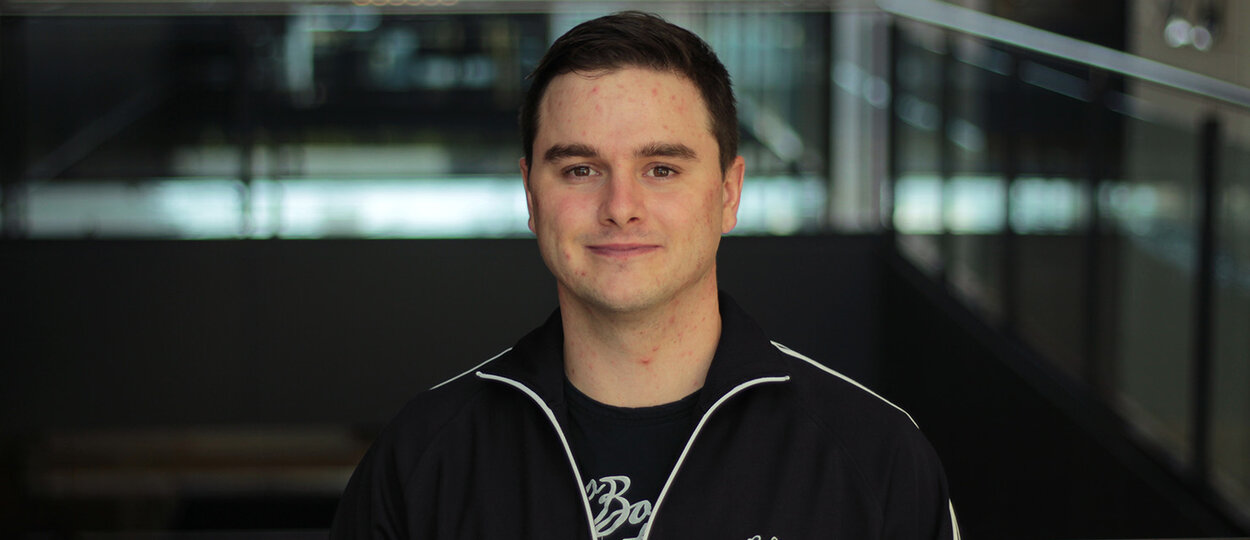Andrew Burke, a graduate of the Leslie Dan Faculty of Pharmacy, credits his U of T education with helping him develop transferable skills that have helped him grow in his career. His current role at a medical device company may not be a traditional career path for Faculty graduates, but he says that his education at the Faculty was essential.
“There are a lot of roundabout ways of getting where you want to be,” he says. “There are endless opportunities, and if you’re persistent and hardworking, you’ll get there.”
Burke, originally from North Bay, completed his undergraduate degree in biopharmaceutical sciences with an interest in genomics at the University of Ottawa. He considered various options for graduate education, ultimately landing on the pharmaceutical sciences program at U of T because of its excellent reputation, the new lab facilities, and the high quality learning and working environments.
“U of T could offer an education at a level that most other universities in Canada just can’t,” he says. “It was an easy choice. It’s a great program in a great building with all the resources I would need to succeed.”
“It was an easy choice. It’s a great program in a great building with all the resources I would need to succeed.”
In September 2014, he started his Master of Science in Pharmaceutical Science, supervised by David Hampson. His research focused on how certain pesticides affect neurodevelopment following prenatal and early post-natal exposure. The project was a change from his earlier interest in genomics and even Hampson’s own specialty in gene therapy, but he enjoyed learning about neuroscience, molecular toxicology, and neurodevelopment.
U of T’s collaborate environment was key in education
As a new graduate two years later, Burke wanted to gain experience in business, specifically in sales. He first worked for a pharmaceutical competitive intelligence firm based in San Francisco, then transitioned to a new role that included a heavier focus on science.
In April 2019, he began his current role as Product and Therapy Specialist in Neuromodulation at LivaNova Canada, a medical device company. The role has commercial components, but Burke also educates neurosurgeons, neurologists, patients and families about a device used to treat drug-resistant epilepsy (and treatment-resistant depression through stimulation of the vagus nerve at the base of the neck. The vagus nerve is responsible for carrying motor and sensory signals between the body and the brain, and stimulating this nerve can lead to a neurochemical and neuroelectrical balance that can significantly improve the lives of patients.
“This industry is a slight departure from pharmaceutical sciences, but I’ve discovered that the neuroscience background I developed while at U of T has been absolutely critical,” he says. “My background has allowed me to carry the conversations that are needed to educate the individuals who use the device, be it neurosurgeons or neurologists.”
And just as important as the knowledge are the soft skills that he applies in his current role, such as collaboration and critical thinking.
“The collaborative environment at U of T was incredible”
“The collaborative environment at U of T was incredible,” he says. During his Master’s degree, he worked with a number of different labs, was mentored by world-class researchers, and learned from and taught other students. “It was so valuable to share our knowledge. And now sharing knowledge is an important part of my job.”
Burke’s education and career have allowed him to pursue various interests and apply his skills and knowledge in new directions – and he suggests new graduates can also look for opportunities in the field they may not have considered before.
“Use what you have learned in your education and the skills that you’ve developed to pursue your passion,” he says. “Don’t be afraid to broaden your area of focus. Your transferrable skills and education can help you succeed in all areas of medical science and health care.”
By: Eileen Hoftyzer
More News
Image

Dean Lisa Dolovich reappointed for second term
Professor Lisa Dolovich has been reappointed for a second term as Dean of the Leslie Dan Faculty of Pharmacy, University of Toronto, effective July 1, 2025, to December 30, 2030.
Read More
Image

Pharmacy Summer Camp gives high school students insight into pharmacy profession
A new summer camp based at the faculty will give high school students a range of experiences in pharmacy and pharmaceutical sciences.
Read More
Image

Team GloveLift wins 2025 Business Plan Competition with innovative medical device
PharmD students win $5,000 prize for their innovative medical device concept aimed at improving patient care.
Read More
